- Saint Louis Public Schools
- ST. LOUIS POST-DISPATCH (2012-13 ARCHIVES)
- ST. LOUIS POST-DISPATCH: St. Louis school's valedictorian debates ... Princeton - May 17, 2013
News Coverage Archives
Page Navigation
- Overview
- Articles
- Calendar
-
ST. LOUIS AMERICAN (2012-13 ARCHIVES)
- ST. LOUIS AMERICAN: STL Aerospace Institute to hold information session ... - July 29, 2013
- ST. LOUIS AMERICAN: COMTO mentors students - June 20, 2013
- ST. LOUIS AMERICAN: The American, public schools and Wash U. collaborate on STEM ... - June 6, 2013
- ST. LOUIS AMERICAN: Dr. Dorothea King-James to be inducted into Vashon HOF June 9 - June 4, 2013
- ST. LOUIS AMERICAN: Fighting bullying with the Bard - May 29, 2013
- ST. LOUIS AMERICAN: Black superintendents by the numbers - May 23, 2013
- ST. LOUIS AMERICAN: JJK salutes SLPS student athletes - May 16, 2013
- ST. LOUIS AMERICAN: SLPS senior wins Oral Advocacy Competition - May 16, 2013
- ST. LOUIS AMERICAN: Spotlight on student athletes - May 9, 2013
- ST. LOUIS AMERICAN: PGA outreaches to public schools - May 9, 2013
- ST. LOUIS AMERICAN: Regions Bank empowers SLPS students through web-based program - April 26, 2013
- ST. LOUIS AMERICAN: Home-grown physician, St. Louis-style - April 25, 2013
- ST. LOUIS AMERICAN: Dance St. Louis grants Career Awards - March 21, 2013
- ST. LOUIS AMERICAN: Roosevelt Grad Pursues Nursing Career - March 20, 2013
- ST. LOUIS AMERICAN: SLPS Student 'SCORES' with Poetry - February 20, 2013
- ST. LOUIS AMERICAN: SLPS Students Win Creative Challenge - February 20, 2013
- ST. LOUIS AMERICAN: Walgreens Honors Teen Health Community Leaders - February 5, 2013
- ST. LOUIS AMERICAN: History Museum Hosts Walgreens Expression Challenge WInners - January 28, 2013
- ST. LOUIS AMERICAN: Put Down The Pistol Leader Visits Yeatman - January 18, 2013
- ST. LOUIS AMERICAN: 2012 SLPS Secondary Science Teacher of the Year Award - January 10, 2013
- ST. LOUIS AMERICAN: Congregations Donate Winter Clothes - January 3, 2013
- ST. LOUIS AMERICAN: Congregations donate winter clothes - January 3, 2013
- ST. LOUIS AMERICAN: SLPS Educator Publishes Teaching Series - January 3, 2013
- ST. LOUIS AMERICAN: STL Student Elected National President - December 20, 2012
- ST. LOUIS AMERICAN: Gateway MST Teacher Given Golden Apple - December 20, 2012
- ST. LOUIS AMERICAN: Gateway MST Teacher Given Golden Apple - December 20, 2012
- ST. LOUIS AMERICAN: Rhea Willis Is Special Ed Teacher of the Year - December 20, 2012
- ST. LOUIS AMERICAN: African Americans on St. Louis Magazine’s ‘Power List’ - December 20, 2012
- ST. LOUIS AMERICAN: SLPS Honors PE Teachers of the Year - December 13, 2012
- ST. LOUIS AMERICAN: Trevonte Brock Wins MVP Award - December 13, 2012
- ST. LOUIS AMERICAN: Brittany Packnett Comes Home to ... - December 13, 2012
- ST. LOUIS AMERICAN: United Way Introduces Mentoring Program - December 6, 2012
- ST. LOUIS AMERICAN: Editorial "Major Step Forward For SLPS" - October 18, 2012
- ST. LOUIS AMERICAN: Public School Guitar Initiative Gives Again - October 4, 2012
- ST. LOUIS AMERICAN: In The News, Paula Knight Appointed To Governor's Board - October 4, 2012
- ST. LOUIS AMERICAN: Doretta Walker Profile - September 13, 2012
- ST. LOUIS AMERICAN: Nicole Williams Profile - September 6, 2012
- ST. LOUIS AMERICAN: SLPS Awarded $2.2 Million P.E. Grant - September 6, 2012
- ST. LOUIS AMERICAN: Boeing Sponsors Roosevelt Health Clinic - September 6, 2012
- ST. LOUIS AMERICAN: Guest Columnist Says Accredit SLPS - August 30, 2012
- ST. LOUIS AMERICAN: SLPS Dedicates Gateway Athletic Field - August 30, 2012
- ST. LOUIS AMERICAN: SLPS Offers Parent Guidebooks - August 30, 2012
- ST. LOUIS AMERICAN: Excellent Educators - August 30, 2012
- ST. LOUIS AMERICAN: Vashon Counselor Saluted By SEMO - August 23, 2012
- ST. LOUIS AMERICAN: Newspapers In Education Story - August 23, 2012
- ST. LOUIS AMERICAN: Accreditation Editorial - August 22, 2012
- ST. LOUIS AMERICAN: Accreditation Story - August 16, 2012
- ST. LOUIS AMERICAN: Columbia School Named School of Excellence Winner - August 16, 2012
- ST. LOUIS AMERICAN: Back To School Festival - August 2, 2012
- ST. LOUIS AMERICAN: SLPS PROP S Projects At 39% MBE - August 2, 2012
- ST. LOUIS AMERICAN: Much To Be Excited About In SLPS - August 2, 2012
- ST. LOUIS AMERICAN: Judge Edwards Named Stellar Perfomer - August 2, 2012
-
ST. LOUIS POST-DISPATCH (2012-13 ARCHIVES)
- ST. LOUIS POST-DISPATCH: St. Louis Public Schools eyes new elementary school - July 28, 2013
- ST. LOUIS POST-DISPATCH: Letter to the Editor: School districts, cultural ... - July 28, 2013
- ST. LOUIS POST-DISPATCH: St. Louis forges unique partnership with KIPP - July 19, 2013
- ST. LOUIS POST-DISPATCH: Editorial: New schools collaboration offers hope ... - July 22, 2013
- ST. LOUIS POST-DISPATCH: Summer jobs program targets St. Louis neighborhoods - July 12, 2013
- ST. LOUIS POST-DISPATCH: Hoops coach Lee finds landing spot at Miller Career - July 12, 2013
- ST. LOUIS POST-DISPATCH: Vashon coach Davis balances basketball, police work - July 7, 2013
- ST. LOUIS POST-DISPATCH: In St. Louis, teachers union plays role ... - June 30, 2013
- ST. LOUIS POST DISPATCH: Only a Few Students Defy St. Louis School's High Turnover .. - May 24, 2013
- ST. LOUIS POST-DISPATCH: Strauss: Senior PGA arrives as more than a golf thing - May 20, 2013
- ST. LOUIS POST-DISPATCH: St. Louis school's valedictorian debates ... Princeton - May 17, 2013
- ST. LOUIS POST-DISPATCH: Ladue tops one high school ranking; Metro another - May 13, 2013
- ST. LOUIS POST-DISPATCH: St. Louis Schools Are Full of Success Stories - May 11, 2013
- ST. LOUIS POST-DISPATCH: Metro, Clayton, Kirkwood high schools top rankings - April 23, 2013
- ST. LOUIS POST-DISPATCH: Gov. Nixon Lauds Program for College Credits, Job Training - April 23, 2013
- ST. LOUIS POST-DISPATCH: Clinton initiative volunteers paint ... at magnet school - April 8, 2013
- ST. LOUIS POST-DISPATCH: Clinton initiative seeks to help students make global ... - April 3, 2013
- ST. LOUIS POST-DISPATCH: Retired City Teachers Concerned About Stagnant Pensions - March 25, 2013
- ST. LOUIS POST-DISPATCH: Cleveland NJROTC High To Remain Open - March 21, 2013
- ST. LOUIS POST-DISPATCH: Madison Prep Wins State Basketball Championship - March 9, 2013
- ST. LOUIS POST-DISPATCH: Three St. Louis Schools, 134 Jobs Face Budget Ax - February 27, 2013
- ST. LOUIS POST-DISPATCH: Women In Military Debate At Cleveland NJROTC - January 26, 2013
- ST. LOUIS POST DISPATCH: Announcement on Women in Combat Opens ... - January 26, 2013
- ST. LOUIS POST DISPATCH: Editorial: More Early Childhood Education ... - January 19, 2013
- ST. LOUIS POST DISPATCH: $4.2 Million Grant Targets Children in Two St. Louis ... - January 15, 2013
- ST. LOUIS POST DISPATCH: Helping Hands For Sandy Hook - December 21, 2012
- ST. LOUIS POST-DISPATCH: AT&T Shows Support For BBBSEMO - December 20, 2012
- ST. LOUIS POST DISPATCH: Educators in St. Louis Area Ask What More Can Be Done ... December 14, 2012
- ST. LOUIS POST-DISPATCH: SLPS is a Finalist for Race to the Top Grant - November 29, 2012
- ST. LOUIS POST-DISPATCH: St. Louis Area Boosts Graduation Rates - November 27, 2012
- ST. LOUIS POST-DISPATCH: SLPS Honors P.E. Teachers - November 14, 2012
- ST. LOUIS POST DISPATCH: School Lunches Get an A - October 23, 2012
- ST. LOUIS POST-DISPATCH: Opinion "Fair or Foul, Good News For SLPS" - October 18, 2012
- ST. LOUIS POST-DISPATCH: St. Louis Schools Relish Upgrade - October 16, 2012
- ST. LOUIS POST-DISPATCH: State Board Gives Provisional Accreditation to SLPS - October 16, 2012
- ST. LOUIS POST-DISPATCH: State Board Considers Provisional Accreditation For SLPS - October 15, 2012
- ST. LOUIS POST-DISPATCH: Education Digest, SLPS Receives $710,097 Literacy Grant - October 1, 2012
- ST. LOUIS POST-DISPATCH: Union And SLPS Pledge Unity - September 20, 2012
- ST. LOUIS POST-DISPATCH: Editorial: State Should Honor SLPS Request - September 16, 2012
- ST. LOUIS POST-DISPATCH: State Board to Review SLPS Accreditation Status - September 15, 2012
- ST. LOUIS POST-DISPATCH: SLPS Petitions State For Accreditation - September 11, 2012
- ST. LOUIS POST-DISPATCH: Program Helps Refugee Students Adjust To America - September 4, 2012
- ST. LOUIS POST-DISPATCH: Roosevelt High School Health Clinic Opens - August 30, 2012
- ST. LOUIS POST-DISPATCH: SLPS Wins Lawsuit Against Former District Leader - August 30, 2012
- ST. LOUIS POST-DISPATCH: P.E. Grant Story - August 21, 2012
- ST. LOUIS POST-DISPATCH: Editorial - August 16, 2012
- ST. LOUIS POST-DISPATCH: From the Pulpit, a Plug for School Attendance - August 13, 2012
- ST. LOUIS POST-DISPATCH: Imagine Charter School Exiles Swell SLPS Enrollment - August 13, 2012
- ST. LOUIS POST-DISPATCH: Back To School Festival Story - August 6, 2012
- ST. LOUIS POST-DISPATCH: SLPS Awarded Health Careers Grant - July 25, 2012
- ST. LOUIS POST-DISPATCH: SLPS Sells Gardenville School - July 24, 2012
-
ST. LOUIS AMERICAN (2013-14 ARCHIVES)
- ST. LOUIS AMERICAN: SLPS and Missouri Humanities Council partner ... - April 21, 2014
- ST. LOUIS AMERICAN: Education commissioner Nicastro talks ... - April 18, 2014
- ST. LOUIS AMERICAN - Sumner remembers students lost to gun violence - April 10, 2014
- ST. LOUIS AMERICAN: SLPS plan could bring in nonprofit operators - March 20, 2014
- ST. LOUIS AMERICAN: Shout out to SLPS Parents - March 19, 2014
- ST. LOUIS AMERICAN - Health clinic integrates into school culture - Feb. 27, 2014
- ST. LOUIS AMERICAN: Adams’ contract extended - February 13, 2014
- ST. LOUIS AMERICAN - Two year contract extension for SLPS superintendent - February 7, 2014
- ST. LOUIS AMERICAN: SLPS announces two make-up days - February 6, 2014
- ST. LOUIS AMERICAN: Taking the teacher home - January, 30, 2014
- ST. LOUIS AMERICAN: SLPS honors Kindergarten Teacher of the Year - January 2, 2014
- ST. LOUIS AMERICAN: SLPS honors Preschool Teachers of the Year - January 1, 2014
- ST. LOUIS AMERICAN: SLPS names STEM Teacher of the Year - December 11, 2013
- ST. LOUIS AMERICAN: SLPS names Reading Teacher of the Year - December 5, 2013
- ST. LOUIS AMERICAN: Judge Jimmie Edwards receives 2013 Rehnquist Award ... - Nov. 26, 2013
- ST. LOUIS AMERICAN: SLPS names Special Education Teacher of the Year - November 20, 2013
- ST. LOUIS AMERICAN: District champs crowned - November 14, 2013
- ST. LOUIS AMERICAN: SLPS names Music Teachers of the Year - November 13, 2013
- ST. LOUIS AMERICAN: Wells Fargo partners with SLPS - Oct. 30, 2013
- ST. LOUIS AMERICAN: The new Vashon - October 23, 2013
- ST. LOUIS AMERICAN: Supporting new teachers at SLPS - Sept. 26, 2013
- ST. LOUIS AMERICAN: Chat Leonard, SEMO Counselor of the Year - Sept. 12, 2013
- ST. LOUIS AMERICAN: Wanda Patrice LeFlore, Excellence in Education Awardee - Sept. 12, 2013
- ST. LOUIS AMERICAN: Nathalie D. Means Henderson, Excellence in Education Awardee - Sept. 12, 2013
- ST. LOUIS AMERICAN: A store that pampers your pet - September 5, 2013
- ST. LOUIS AMERICAN: Eight excellent educators to be recognized Sept. 13 - September 5, 2013
- ST. LOUIS AMERICAN: 'College geek' is SEMO Counselor of the Year - August 22, 2013
- ST. LOUIS AMERICAN: American’s NIE program named best in nation - August 15, 2013
- ST. LOUIS AMERICAN: SLPS and teachers union get $130K early childhood grant - August 8, 2013
- ST. LOUIS AMERICAN: Lynn Beckwith Jr., 2013 Lifetime Achiever in Education - Aug. 1, 2013
-
May 17, 2013 5:30 am • By Elisa Crouch ecrouch@post-dispatch.com 314-340-8119St. Louis school's valedictorian debates her way to a full ride at Princeton
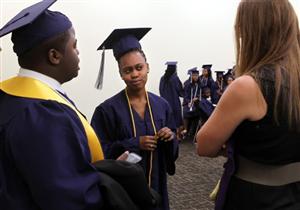
Destiny Crocket (center), the valedictorian at Clyde C. Miller Career Academy, and fellow debate team member Cameron Smith (left) talk with Eve Seyer, a Spanish teacher, before commencement ceremonies at America's Center on Monday, May 13, 2013. Crockett will be the first graduate of the school to attend an Ivy League university by starting at Princeton in the fall with a full scholarship.
Photo by Christian Gooden, cgooden@post-dispatch.com--
ST. LOUIS • The roar was almost deafening as graduates of Clyde C. Miller Career Academy entered the auditorium at the America’s Center to receive their diplomas. Destiny Crockett took her seat on stage, her hands resting in her lap.
She wore a navy blue cap and gown. A silver and navy tassel hung from her mortarboard. But at first, there was nothing to distinguish the 17-year-old as valedictorian, the student with a 4.1 grade-point average, the one who had accomplished what no other student at the school had ever achieved.
Destiny is the first graduate of this St. Louis high school to ascend to the Ivy League, with a full scholarship to Princeton University, and full scholarship offers from Georgetown, Agnes Scott and Dartmouth universities.
She and her debate partner, Cameron Smith, were the first from St. Louis Public Schools to achieve Top 16 status at a national debate competition last month, putting Clyde C. Miller Academy on the national debate map.
In June, they’ll become the first qualifying St. Louis team to compete at the National Forensic League’s national debate tournament in Birmingham, Ala.
Principal Steve Warmack says the pair are the best students he’s seen in 40 years.
But Destiny doesn’t like to point these things out.
In her valedictory address, she told her 181 classmates that they share the same trajectory.
“We can ride the wind and fly farther than we ever thought we could,” she said. “Everyone is meant to fly.”
A DESIRE TO LEARN
Like many students in St. Louis Public Schools, Destiny grew up in humble circumstances, most recently in a red brick walk-up flat in the Tower Grove East neighborhood. Her father died before she was born. Her mother, Latoya Mickens, raised her while juggling work as a restorative therapist at a nursing home, and more recently, while earning her bachelor’s degree in business administration at Fontbonne University.
Mickens taught Destiny to read using a Langston Hughes poem, “I, Too.” In it, an African-American treated as a second-class citizen looks toward a much brighter future.
“That poem really told me what I wanted for Destiny,” Mickens said.
One recent morning, Destiny walked into a high school conference room, skipping lunch for an interview. The school of about 800 students just north of the Fox Theatre is a “choice” school without neighborhood boundaries, one whose entrance requirements include good behavior, attendance and grades.
Nevertheless, Destiny noticed her freshman year that too many of her classmates were struggling readers, she said. They came from district and charter middle schools across the city, some several grade levels behind.
Destiny had attended the city’s gifted schools — Kennard Classical Junior Academy and McKinley Classical Junior Academy. Coming to Clyde C. Miller was a culture shock, Destiny said.
“It was amazing to me that some kids aren’t reading on grade level but still can get straight A’s,” she said.
Destiny points to that year as when her passion for education reform began. She started consuming books about education and race — works by Jonathan Kozol, Wendy Kopp, Cornel West. She began to see education as a great equalizer — and failing schools as the fault of a community.
Her desire to learn only grew. She began challenging her teachers to push her more. If her classes weren’t rigorous enough, her mother came to the school and spoke up.
“Destiny will be the first to demand teaching,” said Samantha Smith, a debate coach. “All four years she’s had somebody she wants more from, in terms of ‘teach me, teach me, teach me.’”
Occasionally, Destiny felt a nagging fear. It stemmed from an increasing awareness of the disparities between her school and those in wealthier suburbs. She wondered if she could ever measure up.
“My fear has always been being left behind,” Destiny said.
GREAT DEBATE
Destiny didn’t seek out debate; she stumbled upon it. One day during cross country practice her freshman year she heard the debate team needed members, so she decided to give it a try.
Debate fed her appetite to learn. It involved research. Analytical thinking. Argument.
The St. Louis school district had begun a partnership with the newly formed St. Louis Urban Debate League, which provided resources that city high schools needed to start or restart debate programs. Clyde C. Miller is one of nine schools under its umbrella.
Destiny was soon paired with Cameron Smith, also a freshman who’d come from Langston Middle School. In time, they became best friends.
“It was sort of random how we were paired,” Cameron said. But right away, he added, “We were a force to reckon with.”
They built cases around the topics of poverty, military and foreign policy, space exploration, and transportation. They mastered ways of arguing both sides of any issue.
Losing pushed Destiny and Cameron harder. Winning fed their addiction to debate.
They had a winning streak their sophomore year, trouncing debaters from other city high schools. Their junior year, they competed against teams from St. Louis County, and across the state.This year they were undefeated at the Missouri qualifiers for the National Forensic League debate competition next month in Birmingham. And in April, their top 16 finish at the Urban Debate League’s national competition was “a profound first for our city,” debate coach Andrew Gallagher said.
It was just as important to Destiny and Cameron to defeat teams from St. Louis County, where debate teams have more experience and resources, they said.
“It told me maybe I can think on my feet a little bit more than a Clayton kid,” Destiny said.
“When you go out there and outsmart them, confuse them, or flat-out beat them like they’ve never debated before, it’s a good feeling,” Cameron said.
Destiny and Cameron finished their freshman year as the only two who stuck with debate at Clyde C. Miller. Now the team is about 15 students strong, in large part because of their effort, Gallagher said.
“They have been the cornerstone of this debate program,” he said.
Inside America’s Center, hundreds of parents and family members cheered, shouted and whistled as the Class of 2013 received their diplomas.
Destiny watched with her steady gaze, sitting in the chair reserved for the valedictorian.
Her mother, grandmother and other extended family were in the first few rows of the auditorium. Cameron, the class president, was seated two chairs away, smiling.
Cameron will attend Wiley College in Marshall, Texas, on full scholarship. The school in northeast Texas is the scene of the 2007 film “The Great Debaters.”
At Princeton, Destiny wants to major in English with a concentration on urban policy. Eventually, she wants to play a role in transforming public education.
“I keep thinking I will be nervous,” she said of her journey. “But I don’t think I have anything to be nervous about. I don’t have any reservations.”
--
The story can be accessed here.

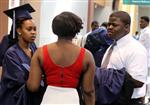
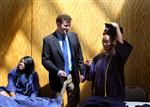
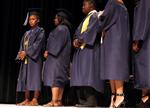
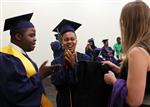
 All photos by by Christian Gooden,
All photos by by Christian Gooden, 